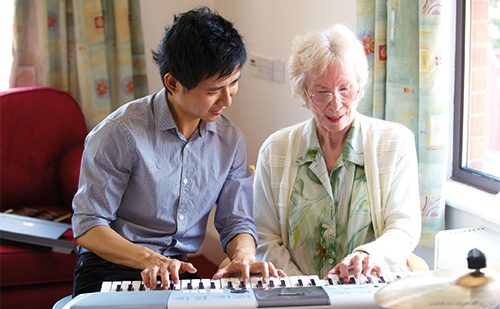- A
- A
- A
Strong start for new music therapy research for dementia

A feasibility study has paved the way for greater research into the workings of music therapy for people with dementia, a conference heard this week.
The study, carried out within national charity Methodist Homes (MHA), indicates the positive effects of music therapy and the potential for a large-scale clinical trial, according to MHA’s Lead Music Therapist Ming Hung Hsu.
Ming was addressing the British Association for Music Therapy at its inaugural conference in the Birmingham, Conservatoire, along with fellow Music Therapists Clare Monckton and Rosamund Pendry. The presentations covered video analysis in psychophysiological research into music therapy, and the benefits of the alternative therapy for people with dementia.
In total, 14 residents from two MHA homes, Homestead in Carterton, Oxfordshire and Fitzwarren House in Swindon, Wiltshire, took part in the five-month period. The trial was conducted with the assistance of Professor Helen Odell-Miller of Anglia Ruskin University.
Ming described the results as “positive”, adding that the protocol of the study appeared to be feasible for a large-scale clinical trial.
“Results indicated the positive effects of music therapy inside and outside music therapy sessions,” he added.
“There is not much research going on into the effects of music therapy for people with dementia, so we are very pleased to be doing this. This has also been a psychophysiological study – we have been collecting data such as skin temperature and heart rate to help indicate the effect music therapy has on people.
“This was just a small feasibility trial but I hope it sets the path to help us understand how music therapy works. A lot of music therapy research now is indicating that it can improve well-being but very little has been done into how it actually works, the mechanisms of it.”
Ming has addressed other international music therapy conferences previously, including ones in Seoul and Norway. He has a Masters in music therapy with a distinction from Anglia Ruskin University and has been working on a PhD there with funding from MHA.
Ming said, “I will research how Music Therapy can improve quality of life for care home residents. Nobody has yet looked into how exactly Music Therapy works. There have been studies showing that it works, but none into how or why. I’m going to be looking into that.”
MHA is a national charity providing accommodation, care and support services to 16,000 older people. It will make a call for donations to fund Music Therapy, which is provided to residents without charge, on the Radio 4 Appeal on 6 July.
